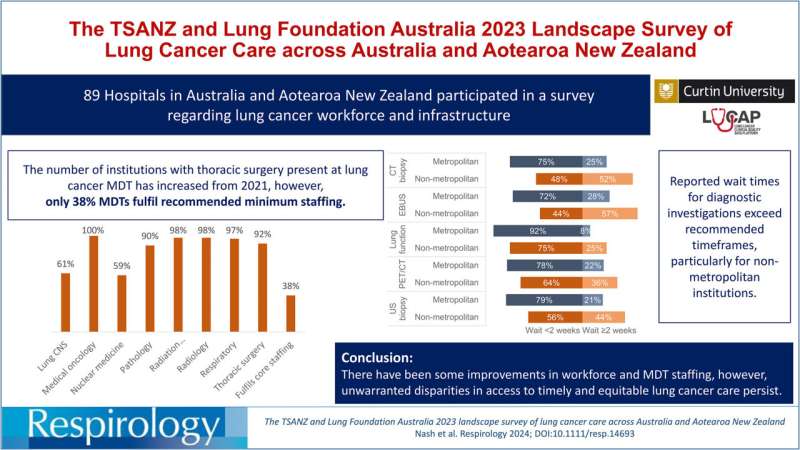This article has been reviewed according to Science X's editorial process and policies. Editors have highlighted the following attributes while ensuring the content's credibility:
fact-checked
trusted source
proofread
Study reveals major gaps in lung cancer services across Australia and New Zealand

Researchers from Curtin University have identified critical gaps and inconsistencies in the provision and quality of care for lung cancer patients across Australia and New Zealand.
A survey of 89 public and private hospitals across Australia and New Zealand identified critical staffing gaps such as provision of specialist lung cancer nurses and access to nuclear medicine specialists. The survey also found just 38% of all lung cancer teams met minimum staffing requirements for a multidisciplinary team, as defined by Cancer Australia.
This study was a follow-on from a similar study from 2021.
Lead investigator Professor Fraser Brims from the Curtin Medical School said across Australia and New Zealand lung cancer is the leading cause of cancer death and has the highest burden of disease for any cancer, with more than 16,000 new cases a year.
"The complexity of investigating and treating lung cancer has changed significantly in the past 10 years and if centers can't provide a complete specialist team, the evidence suggests the quality of care will decline," Professor Brims said.
"Compared to the findings from 2021, there have been improvements, with more centers meeting core staffing requirements, a significant increase in the number of centers with thoracic surgeons at case discussions and a modest increase in specialist nurse availability.
"However, we remain very concerned that only just over one-third (36%) of multidisciplinary teams discuss every case of suspected lung cancer in their hospitals. This suggests that many patients are not receiving the standard of care they deserve."
Lung Foundation Australia Chief Executive Officer Mark Brooke said the planned roll-out of a National Lung Cancer Screening Program in July 2025 was a big opportunity to improve lung cancer services.
"There is an urgent need for jurisdictions and institutions to enhance and support services for patients with lung cancer in Australia, particularly the immediate uplift in the number of specialist lung cancer nurses looking after Australia's leading cancer killer," Brooke said.
Recently published in journal Respirology, Professor Brims said the research demonstrated clear differences between the provision of staff and infrastructure to investigate and treat lung cancer between metropolitan and regional services.
"There are multiple examples from Australia and New Zealand of different outcomes for different populations with lung cancer, this study starts to unravel and demonstrate why this is occurring," Professor Brims said.
"Curtin University is leading a national collaboration to identify and alleviate unwarranted differences in care for lung cancer patients across Australia and New Zealand, called the LUCAP project.
"LUCAP seeks to use clinical and hospital data to shed light on local lung cancer services. This study is an important part of the process to identify areas of lung cancer care that need to be improved to provide a fair go for all Australians and New Zealanders with lung cancer."
More information: Jessica Nash et al, The TSANZ and Lung Foundation Australia 2023 landscape survey of lung cancer care across Australia and Aotearoa New Zealand, Respirology (2024). DOI: 10.1111/resp.14693



















